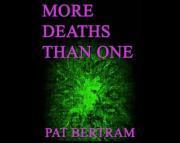Pat Bertram's Blog, page 289
November 16, 2011
Grief Bursts
 From the beginning (the beginning of my grief, that is) I've talked about various aspects of grief, even the parts I thought made me look weak. Today's topic — grief bursts — is one I was going to keep to myself, but it's an important one so I'm going to risk seeming weak once more.
From the beginning (the beginning of my grief, that is) I've talked about various aspects of grief, even the parts I thought made me look weak. Today's topic — grief bursts — is one I was going to keep to myself, but it's an important one so I'm going to risk seeming weak once more.
I've often said that the trouble with grief is that it doesn't stay gone. You think you're doing well, settling into your new life, accepting your situation, and then zap! It hits you, generally when you're least expecting it. One of the worst of these zaps occurred after my life mate had been dead for five months. I dreamed that he died, and in the dream I woke to discover that he was alive and getting better. I could feel the tension of grief draining out of me, and it felt good to just be . . . me. I awoke for real with a smile on my face, glad he was still alive, and then I was sucker punched by the truth. I felt the way I did the first time I realized he was dead, and it set off an upsurge of grief that lasted several months.
Then last spring, at about the fourteen month mark, I was walking, collected and serene, down a suburban street carved out of the desert, and I was blindsided by lilacs. He loved lilacs, and we'd planted lilacs all around our property. The year before he died, the plants were tall enough to create an oasis of privacy, and when they bloomed, we'd go outside and bask in the heavenly scent. When I came to the desert, I never expected to encounter lilacs, but there they were, growing wildly in a vacant lot. That familiar scent, coming toward me when I was unsteeled against a grief upsurge, did me in for a couple of weeks.
The last big upsurge of grief that stayed with me for more than a day or two came at the eighteen month mark. I still don't know why — there was nothing in particular that set it off, and a year and a half doesn't seem like a special anniversary, not like the first year anniversary or the second. Eighteen months just sort of hangs innocuously in the middle. Or it should have, but it didn't. Well, I got through that grief upsurge like I did all the others. (How? Glad you asked that. The only way to get through a grief upsurge is to feel it, process it, and when it begins to abate, let go.)
Mostly now, I've settled into uncoupled life. I miss him, of course, and yearn desperately at times to talk with him, but I've accepted as well as is possible that I have to continue on with my life. I feel like myself again (meaning I don't feel weighted down with grief all the time, nor do I hold myself tensed against possible upsurges of pain).
What I do experience are grief bursts — a brief burst of grief, with all the angst I felt at the beginning, that lasts but a minute or two. These bursts come a couple of times a day, generally after I've been concentrating on a project (such as writing a blog or reading a book), and in the moment when my mind is not otherwise engaged, I remember that he's dead, and grief bursts over me. I cry for a minute or two as if my heart will break (though I know it won't. It's already been shattered and glued back together, stronger than before). And then I'm fine again with no lingering aftereffects.
Of all the strange stages of grief I've experienced, these grief bursts are the strangest. Like being skewered with a burning poker and then healed a second later. This particular stage, or so I've been told, can last a long time. Even decades after a significant death, you can experience bursts of grief. I'm sure, like all the other phases of grief I've gone through, these bursts will diminish in frequency, perhaps even diminish in intensity, but oddly, this is one stage of grief I don't mind. It reminds me that he was worth grieving for, that his absence from this world matters, that he once was part of my life.
Tagged: death, grief, grief bursts, loss, stages of grief, uncoupled life








November 15, 2011
The Miraculous Resurrection of the Suspense/Thriller Writers Group on Facebook
 A few days ago I talked about how when I first joined Facebook, I hadn't a clue what to do, and how quite by accident, I became a moderator of an almost defunct writing group called the Suspense/Thriller Writers. I was trolling around the site, looking for groups that might interest me, and I stumbled on that particular group, which had but eight members. On the right sideboard was a button that said, "become a moderator of this group." I was curious what becoming a moderator would entail, so I clicked the button. And that's how I became the moderator of the group. To make it a viable group, rather than a typical Facebook group where people just posted book covers and other promotional bits, I decided to have weekly discussions.
A few days ago I talked about how when I first joined Facebook, I hadn't a clue what to do, and how quite by accident, I became a moderator of an almost defunct writing group called the Suspense/Thriller Writers. I was trolling around the site, looking for groups that might interest me, and I stumbled on that particular group, which had but eight members. On the right sideboard was a button that said, "become a moderator of this group." I was curious what becoming a moderator would entail, so I clicked the button. And that's how I became the moderator of the group. To make it a viable group, rather than a typical Facebook group where people just posted book covers and other promotional bits, I decided to have weekly discussions.
We had some great discussions about improving our craft, but facebook, in it's infinite wisdom (that is irony, in case you didn't catch it) decided to get rid of the discussion boards. Without the discussion board and the help we offered each other, any serious discussions rapidly disappeared beneath the steady stream of self-promotion. So all we could do was post information about our books, and in doing so, we lost many of those serious about writing.
On Sunday, something miraculous happened. The members of the group began talking about what they wanted from the group and what they didn't want. Mostly, what they didn't want was blatant self-promotion, and especially from members who never bothered to participate in any group activities. So, we decided to limit such promotion to Saturday (and I'm hoping to make that a fun day where everyone gets together to talk about their books).
This is the first time in a very long time I've felt any excitement at being on Facebook. Not only did we reclaim our group, but I made new friends and reconnected to some long-time facebook friends who had disappeared from my newsfeed.
And today, something else miraculous happened. I found the link to our original discussion board!!! It's still viable, just not linked to the group, so I don't know if it's worth using, but all that great information is not lost, and losing the information worried me most of all.
So where did I find the link? Here on my blog!! I have a terrible habit of blogging about everything in my cyberworld, and once (or twice or who knows how many times!) I blogged about my facebook activities. Three years ago exactly (well, minus one day — the post was November 14, 2008) I asked people to join the Suspense/Thriller Writers group, and listed some of the links. And darn if those links don't still work! Wow!
So, if you're interested in learning more about writing, meeting writers, networking, join the Suspense/Thriller Writers. All writers (and readers) are welcome. If you don't think you write suspense, think again. Whatever genre you write, you still write suspense. Suspense at its most basic is making readers worry about what is going to happen to your characters. If they don't worry, they have no reason to read. Besides, all genres make use of the same basic story elements: plot, characterization, scenes, description. So, see you on Facebook.
Speaking of facebook, you can friend me here: Pat Bertram, but if you want to friend me, be sure you tell me why (say you saw me on my blog or some such). I don't friend everyone who asks, though I once did. I want to actually get to know the people I know. Also, you can "like" me here: Pat Bertram. I hope you do. "Like" me, I mean.
Tagged: Facebook, Pat Bertram, Suspense/Thriller Writers Group on Facebook, writing discussions








November 14, 2011
Proving I Am Human
 My email provider has apparently decided I am not human. Every time I try to send an email, it posts strangely twisted letters for me to identify to prove that I am not a machine. Since I have a hard time seeing some of the twists and turns, occasionally this email provider kicks me off its site for not being human.
My email provider has apparently decided I am not human. Every time I try to send an email, it posts strangely twisted letters for me to identify to prove that I am not a machine. Since I have a hard time seeing some of the twists and turns, occasionally this email provider kicks me off its site for not being human.
Does anyone else see the irony of trying to prove to a computer that I am other than it? And losing?
Perhaps the computer should be trying to prove to me that it exists. Or at least that it knows what it's doing. My email provider says there has been too much spam being sent from my IP address, which is why they need this proof of humanity (as if humans never send junk email) but the IP address they say is mine, the email address all that spam is originating from is in Kansas City. Huh? What does that have to do with me? I am more than a thousand miles away from Kansas, though maybe I fell down a rabbit hole without being aware of it? No, wait . . . rabbit holes have to do with Wonderland, not Kansas. Must be all this email jabberwocky that's confusing me. Or perhaps to a computer — which I may or may not be — Wonderland and Oz are the same place.
I do understand the rationale behind the captchas — spam is getting way out of control. In the last few weeks, three people I know had their email accounts hacked, and two lost the accounts and everything in them. At least a dozen Facebook friends had their profiles hacked in the past couple of days and naked photos were posted through their accounts (photos that have over five hundred thousand likes, I might add — apparently I'm going about social networking all wrong. I'm lucky to get five likes per post).
And on top of all this, every few minute a png file tries to open itself on my computer, files with bizarre names such as jkjsylddw.png or qwxxcvjks.png. Perhaps a computer or two has decided I'm one of them and they are coming on to me?
Ah, well, I'll just have to continue traveling the twisted path of trying to prove I am human. But I still think it's bizarre I have to continually prove it. I mean, whatever happened to "I think, therefore I am"? Shouldn't that be proof enough?
Tagged: captchas, email, facebook spam, proving I'm human, spam








November 13, 2011
Here is My Point: There Needs to be a Point When it Comes to Writing
 I saw an indie movie yesterday that was so indie it could actually be considered self-produced. Well, truthfully, it was self-produced — and it went straight to video without a big screen debut, which is something you should all be thankful for. The only reason I watched it was that it was filmed near where I am staying, and I had fun trying to figure out where all the scenes had been filmed. There was no other reason to watch it. The actors were terrible. (I'd read once that a good actor was one who acted natural on the screen. These folk were so unnatural as to make paper doll cut-outs seem life-like in comparison.) The plot was derivative. (You know the story — drug dealers, undercover cops, only one cop left alive at the end and you wish he'd died along with all the rest.) The camera work was appalling — looked as if it had been filmed with a cell phone (as one of my fellow movie watchers put it).
I saw an indie movie yesterday that was so indie it could actually be considered self-produced. Well, truthfully, it was self-produced — and it went straight to video without a big screen debut, which is something you should all be thankful for. The only reason I watched it was that it was filmed near where I am staying, and I had fun trying to figure out where all the scenes had been filmed. There was no other reason to watch it. The actors were terrible. (I'd read once that a good actor was one who acted natural on the screen. These folk were so unnatural as to make paper doll cut-outs seem life-like in comparison.) The plot was derivative. (You know the story — drug dealers, undercover cops, only one cop left alive at the end and you wish he'd died along with all the rest.) The camera work was appalling — looked as if it had been filmed with a cell phone (as one of my fellow movie watchers put it).
So, here's my question. Why did they make that particular movie? What were they thinking — "Let's make a movie that's been made a zillion times before, but let's see how bad we can make it"? I know they weren't trying to showcase talent — there wasn't any. They weren't trying to have fun with dialogue — it was stilted and silly at best. They didn't show the drug dealer vs. cop conflict in any new light. So, what was the point? I still don't know.
This is the same question I ask myself about many of the books I read, and I get the same response — I don't know what the point is.
But here's my point — there has to be a point, especially when it comes to books, because if there is no point, why would anyone read it? A writer can write for herself, of course, which might be the point of writing the book, but we readers need a reason to read it. Even if it's a light romance or a cozy mystery written only to entertain, there still has to be a reason for it. People do read for entertainment, but if a book gives a reader nothing new — no new experience, no new understanding, no interesting character or situation, no wit or humor, just a rehash of what has been written too many times already — there's not even any entertainment value in it.
I recently read a well-touted book from a debut author, someone I had met on facebook. I looked forward to the book since this woman posted such interesting and witty remarks that I thought for sure her book would be as interesting. It was, to a certain extent — it was well-written, the dialoque was sort-of snappy (though it often came across as contrived) and the story was okay. But it was only okay, nothing special. There was no spark of originality, no reason to care about the character, nothing that explained why hundreds of people wrote glowing reviews. I might be getting to be a bit of a curmudgeon, since obviously I was one of the few who found the book disappointing, but the truth is, I was disappointed. All the way through, I kept thinking, "Why am I reading this? What's the point?"
Books don't need to have a message — in fact, books with messages are often not worth reading — but there has to be a reason for the book to exist beyond an author's imagination, even if it's just for us readers to see what happens to a character we care about.
Tagged: indie movies, message in a novel, reason for reading, the point of a book

November 12, 2011
Blogging Day #49 — Hard Rock Cafe
This is not my 49th day of blogging, of course. I've been blogging since September 24, 2007, and I've written 684 posts, but this is my 49th straight day of posting. I've been wanting the discipline of writing every day, and since I have no focus for fiction, I decided that recommitting myself to blogging is a good way of getting back into writing. Luckily, I usually can find something interesting to say (interesting to me, that is. I can only hope it's interesting to you). But today, I've been out gallivanting with friends and got back late, which leaves me little time and no inclination to pontificate. (I hear your sounds of relief!!)
So here is something I hope will amuse you as much as it did me. This was an exhibit in the Route 66 Museum we visited today:
Here is a close-up of the menu:
Tagged: chalcedony, hard rock cafe, jade, osidian, pun, Route 66 Museum

November 11, 2011
Is It Necessary to Want Something?
 The other day I told a friend about the feeling of expectation that accompanied my grief and how empty I felt when nothing wonderful happened to me. She said we have to make wonderful things happen, we can't just wait. Then she started quizzing me on things I wanted to do. I couldn't come up with anything. I've never really wanted much, never had big dreams or wild fancies. I do want to want something, though. It would give me a goal, a reason to be hopeful, an investment in the future.
The other day I told a friend about the feeling of expectation that accompanied my grief and how empty I felt when nothing wonderful happened to me. She said we have to make wonderful things happen, we can't just wait. Then she started quizzing me on things I wanted to do. I couldn't come up with anything. I've never really wanted much, never had big dreams or wild fancies. I do want to want something, though. It would give me a goal, a reason to be hopeful, an investment in the future.
But here's the conundrum:
We're told that we have to want something, have to try to reach beyond our comfort zone so that perhaps wonderful things will happen to us. At the same time, we're told that all things come to those who wait.
We're told that dreams are important, that we need to have something to live for. At the same time, we're told to be grateful for what we have, to live for the day.
We live in a society with an economy that is built on the principal of wanting. The more we want, the more we buy, the more we use, the more we help the economy. At the same time we're told to be frugal, not to waste, but more trash automatically accompanies more goods. I had to get rid of so much of our stuff when I moved out of our house, that it makes no sense to buy more stuff. So, where does wanting to want something fit in with that situation? I sure don't want more stuff to eventually have to get rid of!
And then, there's the Zen philosophy that we should neither want nor not want.
So what is the answer? Wanting? Or not wanting? Going after something or waiting till it comes to you? Having dreams, or being satisfied with what you have?
(After the conversation with my friend, I did think of something I wanted. I always wanted to make a gingerbread house, so I made a little one. I don't want to eat it, though. But still, I can cross it off my list.)
Tagged: all things come to she who waits, are dreams important?, wanting more, Zen

November 10, 2011
Hurrying Through Grief To See What is On the Other Side
 During the first months of wild grief after the death of my life mate, I occasionally had the feeling that something wonderful was going to happen to me. I don't know why I had that feeling — perhaps my sense of fairness dictated that a great good was needed to balance a great grief. Or perhaps such a cataclysmic closing of one segment of my life demanded an earthshaking opening of another segment. Or perhaps after years of waiting for his suffering to be over, I felt deep down that it was time for me to live.
During the first months of wild grief after the death of my life mate, I occasionally had the feeling that something wonderful was going to happen to me. I don't know why I had that feeling — perhaps my sense of fairness dictated that a great good was needed to balance a great grief. Or perhaps such a cataclysmic closing of one segment of my life demanded an earthshaking opening of another segment. Or perhaps after years of waiting for his suffering to be over, I felt deep down that it was time for me to live.
I wasn't the only one who thought his death might bring good changes to my life. Shortly before he died, he himself told me that everything would come together for me after he was gone. (He never explained what he meant, though, and foolishly, I never asked.) And afterward, my sister, who witnessed my grief and saw it as life affirming, told me that I could be entering the happiest time of my life.
Whatever the truth of it, I held on to the feeling because . . . well, because it was all I had to hold on to. In fact, the feeling was so strong at times that I wanted to hurry through my grief to see what was waiting for me on the other side. But here it is, nineteen months of grief later, and whatever that wonderful thing I expected to happen, didn't.
Part of me is still waiting (just as an ever-diminishing part of me still waits for his phone call to tell me I can come home), but mostly, the feeling that something wonderful was going to happen to me is gone. Oddly, this is not an uncommon feeling for us bereft, and those who had the feeling of expectation also felt let down when nothing wonderful happened, which leads me to believe that the feeling is a survival mechanism, or perhaps another one of the many stages of grief nobody ever talks about. (Those who did have something wonderful happen in their lives weren't able to feel the wonder of it, which left them feeling empty, and that is almost as bad as having nothing wonderful happen.)
Yesterday at the grocery store, I saw one of the hospice social workers who occasionally moderated the grief group I used to attend, and I thanked her for helping me through such a terrible time. During our conversation, I mentioned the odd feeling of anticipation I'd had during my months of grief. She replied, "Something wonderful did happen to you. You got through it."
Is that wonderful enough to account for all those months of expectation? Maybe is has to be.
Tagged: death, getting through grief, grief, loss








November 9, 2011
The Symphony of a Life Gone By
 It is impossible to freeze a single moment of music — what you get is a chord that means little by itself. It only gains meaning by what went before it and what comes after, by existing as part of a whole.
It is impossible to freeze a single moment of music — what you get is a chord that means little by itself. It only gains meaning by what went before it and what comes after, by existing as part of a whole.
Ever since the death of my life mate, I've been haunted by images of him at various stages of his life — when I first met him, when we were in the fullness of our relationship, and then at the end, when there was nothing left but a body depleted of life. Which of these moments was him? Were any of them him? Or, like music, were each a single meaningless chord in the symphony of his life?
This might seem a foolish reflection, but it is one that echoes now that his life has been silenced. When a person is alive, the person you know is the culmination of a life, with everything — every note and chord of his existence — leading up to that very moment and foreshadowing the song of his future. When the person is gone from this earth, there is no more culmination. The man I knew at the end — the man who had spent his last breath — is gone, burned into a pile of ashes and crushed bone. The man I knew at the beginning, the radiant man with half of his life still ahead of him is also gone, burned by the fires of living and dying. So which is the real person? How do you remember a life — a man — when all you have are bits of the whole?
We were not picture takers, and I have but a single photo of him. Although it looked exactly like him when it was taken fifteen years ago, it doesn't look at all like him at the end of his life. For months after his death, I refused to look at the photo, afraid that the image of him in my mind would be supplanted by the image of the photo. Recently I decided it doesn't matter if the image in my head is not of him at all. No image is him. He is gone, his moments forever broken into meaningless chords. I know I cannot hold the whole of him in my mind — it took 63 years of living to play his entire repertoire, parts of which I never heard.
And so, I look at the photo, this single chord of his life, and remember the symphony of a life gone by.
Tagged: death, freezing a single moment of music, life, music as a metaphor for life, remembrance








November 8, 2011
Introduction to Beth Groundwater, Author of "A Real Basket Case"
When I first joined Facebook, like many new members, I hadn't a clue what to do, so I became a moderator of an almost defunct writing group called the Suspense/Thriller Writers. Sounds ho-hum, doesn't it? But it was that simple. I was trolling around the site, looking for groups that might interest me, and I stumbled on that particular group. It had eight members at the time. On the right sideboard was a button that said, "become a moderator of this group." I was curious what becoming a moderator would entail, so I clicked the button. And that's how I became the moderator of the group. To make it a viable group, rather than a typical Facebook group where people just posted book covers and other promotional bits, I decided to have weekly discussions.
Brazen me, I picked people from the group at random (after an active membership drive I had over 1,500 members because those were the days authors were signing up for facebook in droves. Or do I mean signing up in murders — you know, like a murder of crows. What else do you call a convocation of mystery writers?) and asked if they'd like to host a discussion. That was my introduction to Beth Groundwater. Three years ago — November 13, to be exact — I asked if she'd host a discussion, and she said yes. (One of the many strangenesses of Facebook is that the email discussion about the discussion is archived for all times, which is how I know the date, but the discussion itself, which took place on November 18, 2008, has disappeared into the great maw of Facebook's yesteryear.)
It was an apropos discussion, too, considering all the changes Facebook has made. To lead off her discussion, Beth said, "I'd like to see the members of this group help each other figure out how to effectively use the features of Facebook to promote themselves and their books without turning off members of the network." Today, without the discussion board and the help we offered each other, any serious discussions rapidly disappear beneath the steady stream of self-promotion. So all we can do is post information about our books, probably turning off the members of the network in the process.
The discussions may have disappeared from the group, but Beth is still there and still a class act.
The title of this post is Introduction to Beth Groundwater, Author of "A Real Basket Case," but all I did was natter on about me and my running battle with Facebook. So, I'll tell you what — if you click the link below, it will take you to my other blog where I am interviewing Beth. And that interview is all about her. I promise.
Click here for an interview with: Beth Groundwater, Author of "A Real Basket Case"
-
Tagged: authors promoting authors, "A Real Basket Case", Beth Groundwater, Facebook, facebook changes, Suspense/Thriller Writers group








November 7, 2011
Have You Ever Felt as if the World Were Backward and Upside Down?

?drawkcab saw dlrow ruoy fi sa tlef reve uoy evaH
Hɐʌǝ ʎon ǝʌǝɹ ɟǝlʇ ɐs ıɟ ʎonɹ ʍoɹlp ʍɐs ndsıpǝ poʍu¿
¿uʍop ǝpısdn puɐ pɹɐʍʞɔɐq ɥʇoq sɐʍ plɹoʍ ɹnoʎ ɟı sɐ ʇlǝɟ ɹǝʌǝ noʎ ǝʌɐH
At times, we've all felt as if the world was backward and upside down, felt as if we needed to stand on our heads to make sense of life. Come to think of it, the world is upside down all the time, or at least half of it is, though I doubt anyone knows which half is upright and which half is upside down. Does space have an orientation? Is there a top and a bottom? A right and a left? An east and a west? We know the east is where our sun rises (at least, that's what we've been taught) but in space, with no rising suns, with not much of anything in fact, is there an east?
We live on a small ball, careening around in space, twirling and tumbling at unimaginable speeds. And yet, for the most part, we manage to deal with each sluggish day as it comes without a thought to our precarious situation. Some days, we feel as if we are on top of the world even when there's nothing to prove to ourselves that we are on top. Other days, by definition, we have to be at the bottom of the world because, in a globe situation, there is no way for everyone to be on top all the time.
There are some things one cannot make sense of, even when you and the world are both upright. Electrons, for example. We live in an electronic world, with billions of electrons careening around in mostly empty space (hmmm. Too obvious a metaphor, perhaps?). Or maybe there is only one electron zinging around so fast it creates the whole shebang. (Not my idea about there being a single electron, though with the way my mind is working tonight, it might as well be. As for shebang — that's something no one seems to be able to make sense of — apparently it appeared about of nowhere like the big bang.)
Now, don't you feel so much better about your problems? Life may not always make sense, but it muddles along whether we understand it or not.
Tagged: dealing with our problems, electronic world, on top of the world, shebang, upside down world














